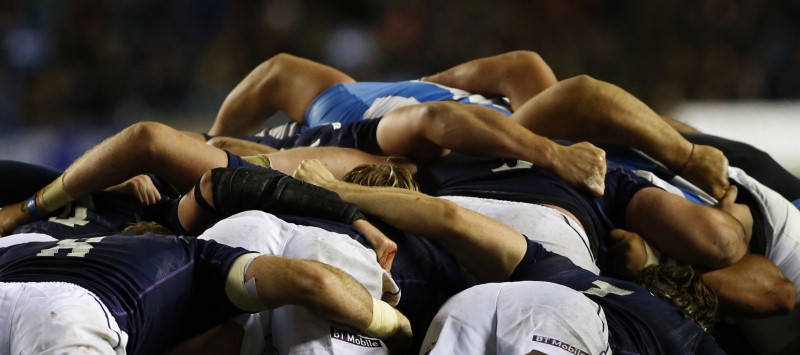LONDON (Reuters) – For all their youthful exuberance and attacking ambition, Scotland’s inexperience at the scrum – a rich seam of points in northern hemisphere international rugby – is holding them back from being Six Nations title contenders.
Vern Cotter’s men held on to seal a famous win over one of the favourites Ireland in the tournament’s opening week, with electric backs like fullback Stuart Hogg and flyhalf Finn Russell inflicting the damage out wide.
But a number of unsteady set pieces took the gloss off that victory and proved the Scots’ undoing a week later as they conceded six penalties and a free kick at scrum time on the way to a narrow defeat by France.
Rugby Union – Scotland v France – RBS Six Nations Championship 2016 – Murrayfield Stadium, Edinburgh, Scotland – 13/3/16Scotlands Greig Laidlaw passes the ball from a scrum
Reuters / Russell Cheyne
Cotter is expected to name an unchanged front row to face Wales on Saturday of Allan Dell, Fraser Brown and Zander Fagerson – the youngest trio in the tournament who between them have little over 30 caps.
The New Zealander could, though, spring a surprise.
The older and heavier loosehead prop Gordon Reid or 100-cap hooker Ross Ford may be preferred to the more mobile Dell or Fraser.
There are fewer alternatives to tighthead Fagerson, who at 21 is the youngest player in the tournament, after WP Nel was ruled out through injury along with another veteran prop in Alasdair Dickinson.
PENALTY SOURCE
Having a solid scrum is crucial to success in the Six Nations where games tend to be fought at closer quarters than the more expansive rugby of the southern hemisphere.
World Rugby data shows more than a third of all scrums in the Six Nations last year resulted in a penalty or a free kick – often providing point-scoring opportunities – a far higher share than the Rugby Championship played between New Zealand, Australia, South Africa and Argentina.
“While for some teams, the ultimate objective is to obtain good quality possession, other teams – especially in the northern hemisphere – view the scrum differently where the scrum is seen as a source of penalties that can produce points and territory. Possession is not the priority,” World Rugby said in its statistical report on the 2016 Six Nations.
Although the power exerted from the back row and channelled through the locks is crucial to winning those scrum battles, there is little substitute for a canny front row with years of experience learning all the tricks of the trade.
“As a prop, you have to be able to scrum. Everything else is a bonus,” Scotland’s Dell said. “I know I’m fine around the park. I know I’ll always have that and can rely on it but my main emphasis is getting better at scrum time.
“There’s so many little things to feel which means it’s all about experience and about getting in and out of trouble in games.”
The average age of the Scotland’s starting front row in their last match was 24 years. The average age of the French and Welsh props and hooker was 26, England’s 28, Ireland’s 29 and Italy’s 31.
Rugby Union – Scotland v England – RBS Six Nations Championship 2016 – Murrayfield Stadium, Edinburgh, Scotland – 6/2/16England’s Billy Vunipola looks over a scrum
Reuters / Russell Cheyne
Livepic
EDITORIAL USE ONLY.
(Editing by Ed Osmond)
Copyright 2017 Thomson Reuters. Click for Restrictions.



